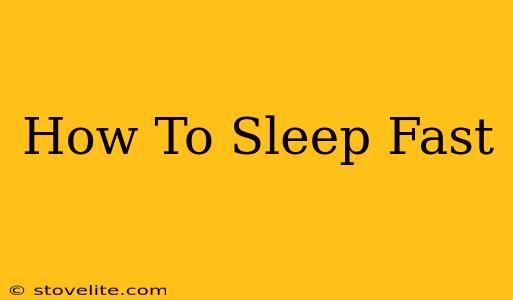Falling asleep quickly can feel like a superpower when you're battling insomnia or just struggling with a busy schedule. But it's a skill you can learn! This guide will provide practical, actionable steps to help you fall asleep fast and consistently enjoy a restful night's sleep.
Prepare Your Body and Mind for Sleep
Before you even hit the pillow, there are several things you can do to prepare your body and mind for a peaceful slumber. These pre-sleep rituals are crucial for establishing a healthy sleep hygiene routine.
Create a Relaxing Bedtime Routine:
- Consistent Sleep Schedule: Go to bed and wake up around the same time every day, even on weekends, to regulate your body's natural sleep-wake cycle (circadian rhythm).
- Wind-Down Time: Dedicate at least 30 minutes before bed to calming activities. Avoid screens (phones, tablets, computers, TV) during this time, as the blue light emitted interferes with melatonin production, a hormone crucial for sleep.
- Warm Bath or Shower: The drop in body temperature after a warm bath can promote relaxation and sleepiness.
- Gentle Stretching or Yoga: Light stretching can relieve muscle tension and promote relaxation. Avoid strenuous exercise close to bedtime.
- Read a Book: Choose a physical book – avoid e-readers – for a relaxing, screen-free activity.
- Listen to Calming Music: Soothing music can help quiet your mind and prepare you for sleep. Explore calming nature sounds or ambient music.
Optimize Your Sleep Environment:
- Dark Room: Darkness signals to your body that it's time to sleep. Use blackout curtains, eye masks, or dim nightlights to minimize light exposure.
- Cool Room Temperature: A slightly cool room (around 65 degrees Fahrenheit or 18 degrees Celsius) is ideal for sleep.
- Quiet Environment: Minimize noise distractions using earplugs or a white noise machine.
- Comfortable Bedding: Invest in a comfortable mattress, pillows, and bedding that suit your preferences.
Techniques to Fall Asleep Quickly
Once you've prepared your environment and mind, try these techniques to speed up the process of falling asleep:
The 4-7-8 Breathing Technique:
This simple breathing exercise can calm your nervous system and promote relaxation. Inhale deeply through your nose for 4 seconds, hold your breath for 7 seconds, and exhale slowly through your mouth for 8 seconds. Repeat this cycle several times.
Progressive Muscle Relaxation:
Systematically tense and relax different muscle groups in your body, starting with your toes and working your way up to your head. This technique helps release physical tension that can interfere with sleep.
Mindfulness Meditation:
Focus on your breath and observe your thoughts without judgment. Mindfulness meditation can help quiet racing thoughts and promote a sense of calm. There are many guided meditations available online or through apps specifically designed for sleep.
Visualization:
Imagine yourself in a peaceful and relaxing place. Engage all your senses – sight, sound, smell, touch, and taste – to create a vivid and immersive experience.
When to Seek Professional Help
If you consistently struggle to fall asleep or stay asleep despite trying these techniques, it's crucial to consult a doctor or sleep specialist. Underlying medical conditions or sleep disorders might be contributing to your sleep problems. They can help you identify the root cause and develop a personalized treatment plan.
Remember: Consistency is key! Establishing a regular sleep routine and practicing these techniques consistently will significantly improve your ability to fall asleep fast and enjoy a good night's sleep. Prioritizing sleep is crucial for your physical and mental well-being. Sweet dreams!

